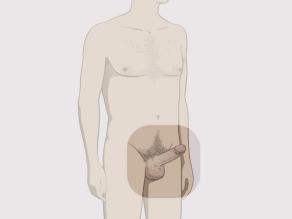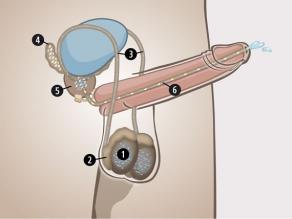Production of semen
Semen is produced like this:
- The testicles produce millions of sperm cells.
- The sperm cells ripen and are stored in the epididymides.
- When a man has an ejaculation, the sperm cells are pushed through the sperm ducts.
- The sperm cells are transported to the prostate and seminal vesicles. Fluid is added to the sperm cells. Together the fluid and the sperm cells make up the semen.
- The semen is pushed out of the penis through the urethra.
When is a man fertile?
A man produces semen for the first time during puberty. In general, a boy becomes fertile between the ages of 12 and 15. He can then have children. Even if he is having sexual intercourse for the first time.
The man produces sperm cells his entire life. He can often have children his entire life.
Contraception: withdrawal and sterilization
A woman can only get pregnant if sperm cells enter the woman’s uterus via her vagina during her fertile days.
Before he ejaculates, a man may already lose a bit of fluid that might contain sperm cells (pre-ejaculate). Withdrawing the penis before ejaculation is not a safe method of contraception.
A man who has undergone sterilization produces semen without sperm cells. He can have sexual intercourse in the normal way.
More information or help needed?
Family doctor
You can talk to a family doctor about almost every intimate issue. If necessary the family doctor can refer you to a specialised health professional. Find a family doctor in your neighbourhood:
Community health centre (wijkgezondheidscentrum)
You can visit a family doctor in a community health centre. Other care professionals such as nurses and social workers also work at community health centres. Care is provided free of charge. Find a community health centre in your neighbourhood:
CAW - Centrum Algemeen Welzijn
Centre for general well-being - Help with all kinds of issues: a difficult relationship, medical, financial, administrative, legal or material problems, family problems,... CAWs also provide assistance to victims of violence and abuse. Find a CAW in your neighbourhood:


